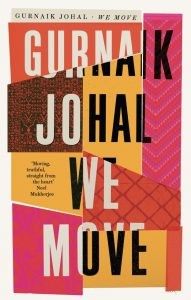A LOT of exciting literary voices have emerged in the past few years and one of the youngest is exciting new author Gurnaik Johal.
The 23-year-old Southall born and raised writer has followed up impressive achievements that include having one of his stories shortlisted for the Guardian/Fourth Estate Prize 2018, when he was just 19 and winning the 2022 Galley Beggar Press Short Story Prize, with his newly released debut book We Move. The short story collection set between South-all and India, tackles themes of politics, activism, relationships, sexuality, community, and shared history.
Eastern Eye caught up with the University of Manchester graduate, who balances writing with working as an assistant editor at Hachette Children’s division, to discuss his new book. He also spoke about his forthcoming novel, inspirations, and key advice for other young writers.
What connected you to writing stories?
When I was a teenager, I wanted to be an artist. But I didn’t get the grades to study art at university, so applied for an English with Creative Writing degree as a kind of compromise. I wrote my first story as part of that application process and have been continuously working on stories ever since.
How much confidence did having a story shortlisted for the Guardian/Fourth Estate Prize 2018 give you?
It was a huge vote of confidence in what I was trying to do with my short stories. That story, The Piano, which appears in We Move, is a multi-perspective story that shows a cross-section of a community. It’s quite ambitious I think, and I wasn’t sure if that kind of story could work until I got shortlisted for the prize.

What led towards writing your debut book We Move?
I didn’t sit down and decide to write a book. But the stories that I was writing were all organically linked in different ways. One story would grow out of another, creating a kind of web. They were all set in the West London neighborhood I’m from, and I started to see different parallels playing out between the stories. It was starting to look book-shaped, and at some point, I realised I wasn’t just writing stories, but that I was creating a collection.
Tell us about the book?
We Move is a collection of interconnected stories set in and around Southall. It spans about five decades and follows the lives of multiple generations of immigrants. The title comes from a phrase meaning to stay hopeful regardless of your situation, and I think that’s a sentiment that links the characters across the stories.
What inspired the stories and are any based on real life?
These are realist stories, or at least close to real, so to some extent they resemble real life, and some are inspired by real historical events, but they’re not inspired by my real life. My life would be quite dull material for a story.
Is there any one particular story that is a favourite?
I couldn’t pick favourites, though there were a few that were much easier to write than others.
Who are you hoping connects with these stories?
As a reader, I’ve connected with stories from all over the world, from different cultures and time periods. So as a writer, I’d hope that anyone could connect with my stories, regardless of their background. I’m certainly not writing for anyone in particular.
What was the biggest challenge of writing this book?
In the autumn of 2019, I spilled a cup of coffee on my laptop and lost all my work from the previous three years. I pretty much started from scratch, rewriting the stories I could remember. Looking back, it might have been a useful editing process!
What according to you makes for a good short story?
I think a good story satisfies you but leaves you wanting more, just like a good meal would.
What do you enjoy reading and do you have a favourite book?
I’m a bad reader – I’m terrible at finishing things! Because of this, I read widely, dipping in and out of different books at the same time. Short story collections suit me in that way – a formative one for me was Yiyun Li’s A Thousand Years of Good Prayers.
What can you tell you about your forthcoming novel?
It follows the story of the ancient holy Saraswati River being brought back to life in a modern-day India. Seven disparate lives are woven around the story of the river, focussing on characters from seven different Punjabi diasporas around the world. It’s a novel about the climate crisis, religious extremism, and the aftershocks of empire.
You have achieved a lot at a relatively young age, what advice would you give
aspiring young writers?
Well, from my personal experience, my first tip would be to back up your work! Beyond that, I would say that for me, writing is mostly editing and that you should not send anything out until you have gone through multiple redrafts. I find that reading aloud can help you easily spot mistakes.
What inspires you?
I’m inspired by something or other every day, it’s a hard question to answer. This morning I was inspired by a radio documentary – Zakia Sewell’s, My Albion.
Why should we pick up your new book We Move?
If nothing else, it’s good value for money. There are 17 stories here, all very different. If I can extend the food metaphor from earlier, We Move is somewhere between a tasting menu and an all-you-can-eat buffet. I’d hope there’s something in the book for all sorts of readers.
